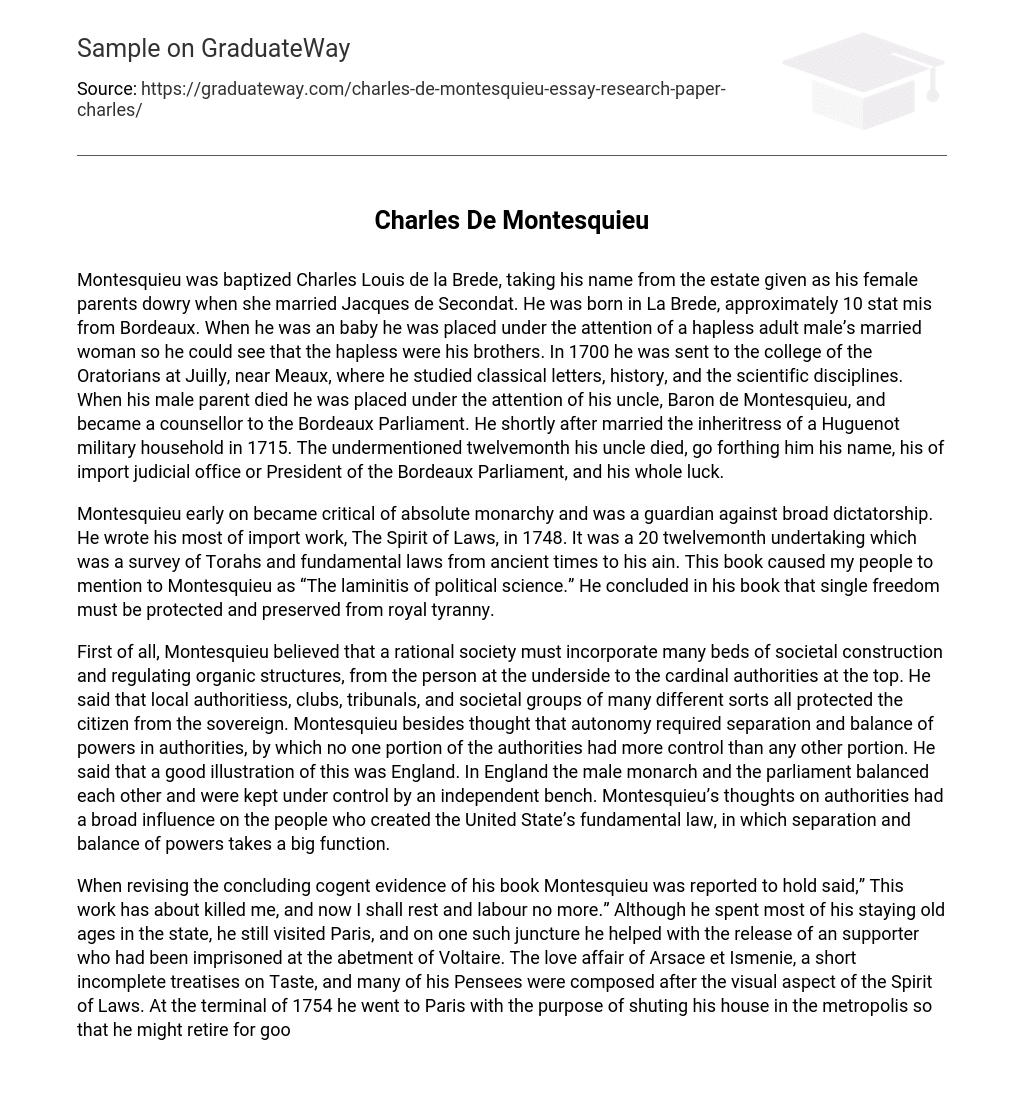Montesquieu was baptized Charles Louis de la Brede, taking his name from the estate given as his female parents dowry when she married Jacques de Secondat. He was born in La Brede, approximately 10 stat mis from Bordeaux. When he was an baby he was placed under the attention of a hapless adult male’s married woman so he could see that the hapless were his brothers. In 1700 he was sent to the college of the Oratorians at Juilly, near Meaux, where he studied classical letters, history, and the scientific disciplines. When his male parent died he was placed under the attention of his uncle, Baron de Montesquieu, and became a counsellor to the Bordeaux Parliament. He shortly after married the inheritress of a Huguenot military household in 1715. The undermentioned twelvemonth his uncle died, go forthing him his name, his of import judicial office or President of the Bordeaux Parliament, and his whole luck.
Montesquieu early on became critical of absolute monarchy and was a guardian against broad dictatorship. He wrote his most of import work, The Spirit of Laws, in 1748. It was a 20 twelvemonth undertaking which was a survey of Torahs and fundamental laws from ancient times to his ain. This book caused my people to mention to Montesquieu as “The laminitis of political science.” He concluded in his book that single freedom must be protected and preserved from royal tyranny.
First of all, Montesquieu believed that a rational society must incorporate many beds of societal construction and regulating organic structures, from the person at the underside to the cardinal authorities at the top. He said that local authoritiess, clubs, tribunals, and societal groups of many different sorts all protected the citizen from the sovereign. Montesquieu besides thought that autonomy required separation and balance of powers in authorities, by which no one portion of the authorities had more control than any other portion. He said that a good illustration of this was England. In England the male monarch and the parliament balanced each other and were kept under control by an independent bench. Montesquieu’s thoughts on authorities had a broad influence on the people who created the United State’s fundamental law, in which separation and balance of powers takes a big function.
When revising the concluding cogent evidence of his book Montesquieu was reported to hold said,” This work has about killed me, and now I shall rest and labour no more.” Although he spent most of his staying old ages in the state, he still visited Paris, and on one such juncture he helped with the release of an supporter who had been imprisoned at the abetment of Voltaire. The love affair of Arsace et Ismenie, a short incomplete treatises on Taste, and many of his Pensees were composed after the visual aspect of the Spirit of Laws. At the terminal of 1754 he went to Paris with the purpose of shuting his house in the metropolis so that he might retire for good to La Brede. While he was at that place he caught a febrility and died within a two weeks, on February 10, 1755. He was so buried in the Church of St. Sulpice. Memorial services for him were held by the Gallic Academy, the Prussian Academy, and the British Royal Academy. Frederick the Great paid testimonial to him to D’Alembert, and Lord Chesterfield of the London Evening Post lamented his decease as the loss of “a friend to mankind. ”





